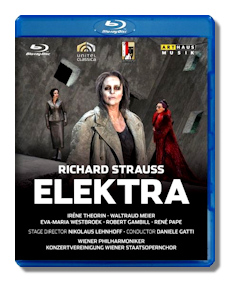
The Internet's Premier Classical Music Source
Related Links
- R. Strauss Reviews
- Latest Reviews
- More Reviews
-
By Composer
-
Collections
DVD & Blu-ray
Books
Concert Reviews
Articles/Interviews
Software
Audio
Search Amazon
Recommended Links
Site News
 Blu-ray Review
Blu-ray Review
Richard Strauss

Elektra
- Elektra - Iréne Theorin (soprano)
- Klytämnestra - Waltraud Meier (soprano)
- Chrysothemis - Eva-Maria Westbroek (soprano)
- Orest - René Pape (bass)
- Aegisth - Robert Gambill (tenor)
- Tutor - Oliver Zwarg (baritone)
Konzertvereinigung Wiener Staatsopernchor
Vienna Philharmonic Orchestra/Daniele Gatti
Production by Nikolaus Lehnhoff
Live, Grosses Festspielhaus, Salzburg Festival, 2010
Arthaus Musik Blu-ray 101560 Widescreen Anamorphic LPCM Stereo Dolby Digital
Also available on DVD 101559: Amazon - UK - Germany - Canada - France - Japan - ArkivMusic - CD Universe - JPC
Richard Strauss loved to write for female singers. His wife was the soprano Pauline de Ahna, to whom he was greatly devoted, despite her supposed bitchy demeanor. Strauss seemed to be an advocate for women in opera, giving them power and numbers: in perhaps his three most important operas – Salome, Elektra and Der Rosenkavalier – the female characters are many and dominant. Without doubt, Strauss pushed women forward at a time when they didn't have the right to vote in most countries. But was his blessing a curse in disguise?
In Elektra we have a character who is a monster, really – especially in this production. Ashen-faced and clad in a dirty drab dress, Elektra constantly plots revenge against Klytämnestra (her mother) and Aegisth (Klytämnestra's lover), the parties responsible for the murder of Elektra's father Agamemnon. Elektra goes about in her obsession for revenge speaking of bloody murder (involving an axe, of course) and planning to draw first her brother, Orest, into her maniacal plot, and then later, after news of his death arrives, her sister, Chrysothemis. Things mostly work out for Elektra: it turns out Orest isn't dead and when he returns, urged on by her, he carries out her plans, killing both their mother and Aegisth. Overcome with ecstatic triumph Elektra does a frenzied dance (although here it is more like a brief stagger) and then falls dead. While this story can be seen as a psychological study of the extremes of loyalty, one might also observe that it shows women can be as obsessive, bloody, murderous and screwed-up as men. So, of course, their liberation would be a no-brainer.
Well, my take on things is a little sarcastic here, I'll admit, but the point is Strauss often treated his female characters a bit strangely, not least because he chose stories for his operas with some of the darkest female characters in literature. A suffragette from the early-20th century might well have mused: with friends like Strauss, who needs enemies? In the end, Strauss probably did advance women's importance in opera, though he might well have been more focused on the sensational aspects of his efforts rather than on their social or political implications.
In this production, the opera is set in a dungeon-like place, with a concrete floor and high walls that impart a sense of being trapped, underscoring well the theme of obsession and bloody revenge. Irene Theorin is brilliant as Elektra and Eva-Maria Westbroek is equally compelling in the role of Chrysothemis. They're quite a contrast, of course: Theorin's Elektra is assertive and unrelenting in her obsession for revenge, while Westbroek's Chrysothemis is rather passive and talks of marriage and having children. She's the most normal character in the opera, but is, one might oxymoronically observe, excessively normal, or so it seems. Both these women have beautiful and quite powerful voices, and both act their roles convincingly. Waltraud Meier as Klytämnestra is also brilliant, and the two male singers are excellent as well.
Nikolaus Lehnhoff's production is effective, though many will sense a certain drabness to the proceedings: there is a predominance of gray and ashen colors in the sets, and of darkness and foreboding in general. Without doubt, that is what Lehnhoff intended in order to underscore the grit and tragedy of the story. Elektra's makeup may be a bit over-the-top: her hair is straggly and dirty-looking, and her face is painted white to give her a corpse-like appearance. Watching this opera in Blu-ray format, you can easily see on the high-def screen that her makeup is as obvious as a clown's, though Lehnhoff may well have intended that overstatement as well, as most aspects here, including modern-day dress of the characters, seem geared toward creating a surreal atmosphere. In the end, it all works well in conveying an effective luridness on stage.
Danielle Gatti leads the orchestra and chorus with a deft sense for Strauss's mixture of post-Romantic lushness and biting dissonance. The sound is excellent and the camera work just fine. I reviewed another Elektra here, back in 2007 (TDK DVWW-OPELEK): Eva Johansson was in the lead and delivered a stunningly fanatical Elektra, though the production was a little off-the-wall and less effective than this new one. This Arthaus Elektra, which received rave reviews during its live run, must be counted among the finest recent productions of this Strauss masterpiece.
Copyright © 2011, Robert Cummings





















